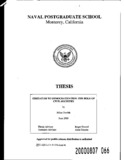Egypt's failure to transition to democracy under the Muslim Brotherhood
| dc.contributor.advisor | Hafez, Mohammed | |
| dc.contributor.author | Guenaien, Moez | |
| dc.date | Sep-14 | |
| dc.date.accessioned | 2014-12-05T20:10:19Z | |
| dc.date.available | 2014-12-05T20:10:19Z | |
| dc.date.issued | 2014-09 | |
| dc.identifier.uri | https://hdl.handle.net/10945/43920 | |
| dc.description.abstract | A year after a democratic presidential election, Egyptian protestors returned to Tahrir Square to demand the resignation of President Mohammed Morsi because he refused to agree to an early election. Shortly after, President Morsi was toppled through a popularly-supported military coup, and his Muslim Brotherhood (MB) organization was thoroughly repressed. Today, the democratic process ushered in by the 25 January Revolution in 2011 has come to an end. Egypt seems to have returned to the previous authoritarian order that existed for over 60 years. Why did democracy fail to take hold in Egypt under the MB regime and President Mohammed Morsi? This thesis explores four hypotheses: Egypt’s non-readiness for democracy because of lack of socio-economic conditions; the failure of Egypt’s political actors to form a pact; the hostility of the Gulf States toward democracy and limited support from the international community; and the dissatisfaction of the deep state and economic elite with the MB in power. While all of these issues contributed to democracy failure in Egypt, the most critical component was that of the contribution of the political actors. If the political actors had formed a pact with the understanding that democracy would benefit all parties, they could have overcome the former regime and succeeded at aligning international support. | en_US |
| dc.description.uri | http://archive.org/details/egyptsfailuretot1094543920 | |
| dc.publisher | Monterey, California: Naval Postgraduate School | en_US |
| dc.rights | This publication is a work of the U.S. Government as defined in Title 17, United States Code, Section 101. Copyright protection is not available for this work in the United States. | en_US |
| dc.title | Egypt's failure to transition to democracy under the Muslim Brotherhood | en_US |
| dc.type | Thesis | en_US |
| dc.contributor.secondreader | Robinson, Glenn E. | |
| dc.contributor.department | National Security Affairs | |
| dc.subject.author | Egyptian politics | en_US |
| dc.subject.author | democratic transition | en_US |
| dc.subject.author | Muslim Brotherhood | en_US |
| dc.description.service | Captain, United States Army | en_US |
| etd.thesisdegree.name | Master of Arts in Security Study (Middle East, South Asia, Sub-saharan Africa) | en_US |
| etd.thesisdegree.level | Masters | en_US |
| etd.thesisdegree.discipline | Security Study (Middle East, South Asia, Sub-saharan Africa) | en_US |
| etd.thesisdegree.grantor | Naval Postgraduate School | en_US |
| dc.description.distributionstatement | Approved for public release; distribution is unlimited. |
Files in this item
This item appears in the following Collection(s)
-
1. Thesis and Dissertation Collection, all items
Publicly releasable NPS Theses, Dissertations, MBA Professional Reports, Joint Applied Projects, Systems Engineering Project Reports and other NPS degree-earning written works.





